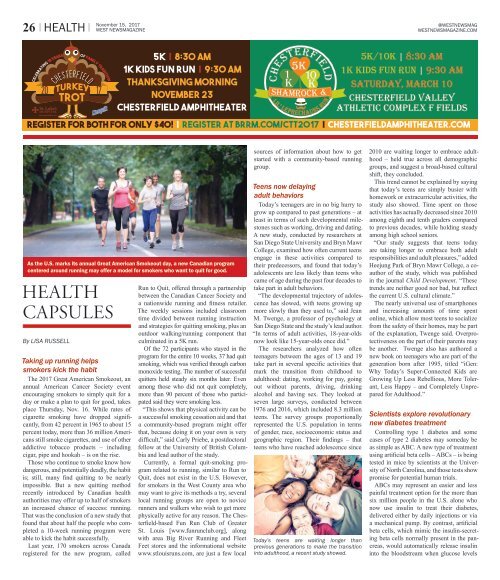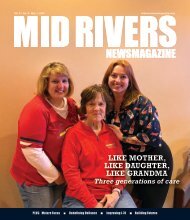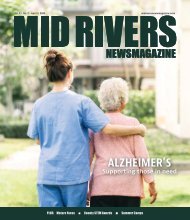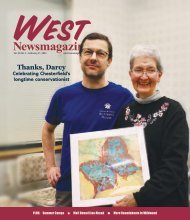West Newsmagazine 11-15-17
Local news, local politics and community events for West St. Louis County Missouri.
Local news, local politics and community events for West St. Louis County Missouri.
You also want an ePaper? Increase the reach of your titles
YUMPU automatically turns print PDFs into web optimized ePapers that Google loves.
26 I HEALTH I<br />
November <strong>15</strong>, 20<strong>17</strong><br />
WEST NEWSMAGAZINE<br />
@WESTNEWSMAG<br />
WESTNEWSMAGAZINE.COM<br />
CELEBRATING 18 YEARS<br />
CHESTERFIELD<br />
20 16 <strong>17</strong><br />
trot<br />
OF FAMILY TRADITION<br />
As the U.S. marks its annual Great American Smokeout day, a new Canadian program<br />
centered around running may offer a model for smokers who want to quit for good.<br />
health<br />
capsules<br />
By LISA RUSSELL<br />
Taking up running helps<br />
smokers kick the habit<br />
The 20<strong>17</strong> Great American Smokeout, an<br />
annual American Cancer Society event<br />
encouraging smokers to simply quit for a<br />
day or make a plan to quit for good, takes<br />
place Thursday, Nov. 16. While rates of<br />
cigarette smoking have dropped significantly,<br />
from 42 percent in 1965 to about <strong>15</strong><br />
percent today, more than 36 million Americans<br />
still smoke cigarettes, and use of other<br />
addictive tobacco products – including<br />
cigar, pipe and hookah – is on the rise.<br />
Those who continue to smoke know how<br />
dangerous, and potentially deadly, the habit<br />
is; still, many find quitting to be nearly<br />
impossible. But a new quitting method<br />
recently introduced by Canadian health<br />
authorities may offer up to half of smokers<br />
an increased chance of success: running.<br />
That was the conclusion of a new study that<br />
found that about half the people who completed<br />
a 10-week running program were<br />
able to kick the habit successfully.<br />
Last year, <strong>17</strong>0 smokers across Canada<br />
registered for the new program, called<br />
Run to Quit, offered through a partnership<br />
between the Canadian Cancer Society and<br />
a nationwide running and fitness retailer.<br />
The weekly sessions included classroom<br />
time divided between running instruction<br />
and strategies for quitting smoking, plus an<br />
outdoor walking/running component that<br />
culminated in a 5K run.<br />
Of the 72 participants who stayed in the<br />
program for the entire 10 weeks, 37 had quit<br />
smoking, which was verified through carbon<br />
monoxide testing. The number of successful<br />
quitters held steady six months later. Even<br />
among those who did not quit completely,<br />
more than 90 percent of those who participated<br />
said they were smoking less.<br />
“This shows that physical activity can be<br />
a successful smoking cessation aid and that<br />
a community-based program might offer<br />
that, because doing it on your own is very<br />
difficult,” said Carly Priebe, a postdoctoral<br />
fellow at the University of British Columbia<br />
and lead author of the study.<br />
Currently, a formal quit-smoking program<br />
related to running, similar to Run to<br />
Quit, does not exist in the U.S. However,<br />
for smokers in the <strong>West</strong> County area who<br />
may want to give its methods a try, several<br />
local running groups are open to novice<br />
runners and walkers who wish to get more<br />
physically active for any reason. The Chesterfield-based<br />
Fun Run Club of Greater<br />
St. Louis [www.funrunclub.org], along<br />
with area Big River Running and Fleet<br />
Feet stores and the informational website<br />
www.stlouisruns.com, are just a few local<br />
sources of information about how to get<br />
started with a community-based running<br />
group.<br />
Teens now delaying<br />
adult behaviors<br />
Today’s teenagers are in no big hurry to<br />
grow up compared to past generations – at<br />
least in terms of such developmental milestones<br />
such as working, driving and dating.<br />
A new study, conducted by researchers at<br />
San Diego State University and Bryn Mawr<br />
College, examined how often current teens<br />
engage in these activities compared to<br />
their predecessors, and found that today’s<br />
adolescents are less likely than teens who<br />
came of age during the past four decades to<br />
take part in adult behaviors.<br />
“The developmental trajectory of adolescence<br />
has slowed, with teens growing up<br />
more slowly than they used to,” said Jean<br />
M. Twenge, a professor of psychology at<br />
San Diego State and the study’s lead author.<br />
“In terms of adult activities, 18-year-olds<br />
now look like <strong>15</strong>-year-olds once did.”<br />
The researchers analyzed how often<br />
teenagers between the ages of 13 and 19<br />
take part in several specific activities that<br />
mark the transition from childhood to<br />
adulthood: dating, working for pay, going<br />
out without parents, driving, drinking<br />
alcohol and having sex. They looked at<br />
seven large surveys, conducted between<br />
1976 and 2016, which included 8.3 million<br />
teens. The survey groups proportionally<br />
represented the U.S. population in terms<br />
of gender, race, socioeconomic status and<br />
geographic region. Their findings – that<br />
teens who have reached adolescence since<br />
Today’s teens are waiting longer than<br />
previous generations to make the transition<br />
into adulthood, a recent study showed.<br />
2010 are waiting longer to embrace adulthood<br />
– held true across all demographic<br />
groups, and suggest a broad-based cultural<br />
shift, they concluded.<br />
This trend cannot be explained by saying<br />
that today’s teens are simply busier with<br />
homework or extracurricular activities, the<br />
study also showed. Time spent on those<br />
activities has actually decreased since 2010<br />
among eighth and tenth graders compared<br />
to previous decades, while holding steady<br />
among high school seniors.<br />
“Our study suggests that teens today<br />
are taking longer to embrace both adult<br />
responsibilities and adult pleasures,” added<br />
Heejung Park of Bryn Mawr College, a coauthor<br />
of the study, which was published<br />
in the journal Child Development. “These<br />
trends are neither good nor bad, but reflect<br />
the current U.S. cultural climate.”<br />
The nearly universal use of smartphones<br />
and increasing amounts of time spent<br />
online, which allow most teens to socialize<br />
from the safety of their homes, may be part<br />
of the explanation, Twenge said. Overprotectiveness<br />
on the part of their parents may<br />
be another. Twenge also has authored a<br />
new book on teenagers who are part of the<br />
generation born after 1995, titled “iGen:<br />
Why Today’s Super-Connected Kids are<br />
Growing Up Less Rebellious, More Tolerant,<br />
Less Happy – and Completely Unprepared<br />
for Adulthood.”<br />
Scientists explore revolutionary<br />
new diabetes treatment<br />
Controlling type 1 diabetes and some<br />
cases of type 2 diabetes may someday be<br />
as simple as ABC. A new type of treatment<br />
using artificial beta cells – ABCs – is being<br />
tested in mice by scientists at the University<br />
of North Carolina, and those tests show<br />
promise for potential human trials.<br />
ABCs may represent an easier and less<br />
painful treatment option for the more than<br />
six million people in the U.S. alone who<br />
now use insulin to treat their diabetes,<br />
delivered either by daily injections or via<br />
a mechanical pump. By contrast, artificial<br />
beta cells, which mimic the insulin-secreting<br />
beta cells normally present in the pancreas,<br />
would automatically release insulin<br />
into the bloodstream when glucose levels

















